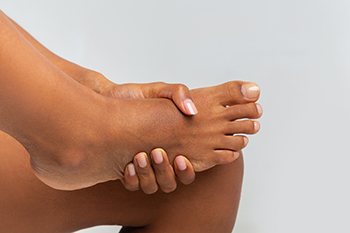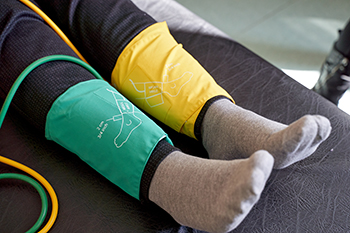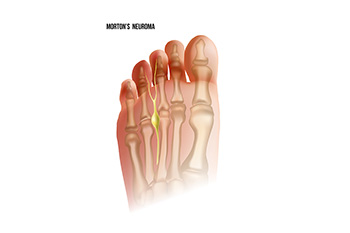Items filtered by date: December 2024
Pickleball and Rheumatoid Arthritis

Pickleball, the fastest-growing sport in the United States, offers an excellent way for individuals with rheumatoid arthritis, or RA, to stay active while managing their condition. Unlike tennis or badminton, pickleball’s smaller court and slower pace make it easier on the joints, while still providing a fun, competitive workout. Regular movement is essential for people with RA, as it helps maintain joint flexibility, reduce stiffness, and improve overall mobility. Pairing pickleball with a nutrient-rich, anti-inflammatory diet supports joint health and boosts energy levels, enhancing your ability to play. Proper preparation, including warming up and wearing supportive footwear, is important to avoid strain on affected joints. If you are a pickleball player with rheumatoid arthritis, and if foot pain or joint discomfort becomes an issue, it is suggested that you schedule an appointment with a podiatrist for personalized care.
Because RA affects more than just your joints, including the joints in your feet and ankles, it is important to seek early diagnosis from your podiatrist if you feel like the pain in your feet might be caused by RA. For more information, contact Bryan Sullivan, DPM of Mississippi Foot Center . Our doctor will assist you with all of your podiatric concerns.
What Is Rheumatoid Arthritis?
Rheumatoid Arthritis (RA) is an autoimmune disorder in which the body’s own immune system attacks the membranes surrounding the joints. Inflammation of the lining and eventually the destruction of the joint’s cartilage and bone occur, causing severe pain and immobility.
Rheumatoid Arthritis of the Feet
Although RA usually attacks multiple bones and joints throughout the entire body, almost 90 percent of cases result in pain in the foot or ankle area.
Symptoms
- Swelling and pain in the feet
- Stiffness in the feet
- Pain on the ball or sole of feet
- Joint shift and deformation
Diagnosis
Quick diagnosis of RA in the feet is important so that the podiatrist can treat the area effectively. Your doctor will ask you about your medical history, occupation, and lifestyle to determine the origin of the condition. Rheumatoid Factor tests help to determine if someone is affected by the disease.
If you have any questions please feel free to contact our office located in Jackson, MS . We offer the newest diagnostic and treatment technologies for all your foot and ankle needs.
Foot Ailments Can Be a Warning Signal

Foot ailments often signal underlying health issues that require attention. Conditions like dry, flaking skin on the feet might suggest fungal infections such as tinea, or could point to dermatitis conditions like eczema or psoriasis that are often linked to stress. Morning foot pain may result from wearing improper footwear or increased physical activity, but persistent pain could indicate more significant problems, like plantar fasciitis or other structural concerns. Cold feet might suggest poor circulation, which can have broader and more serious implications for vascular health. Clawed toes, commonly caused by wearing tight or pointy shoes, can also be associated with nerve damage or improper footwear sizing. Swollen feet, or edema, may result from poor venous circulation, indicating potential vascular or systemic health issues. A podiatrist can address underlying causes and recommend custom orthotics, footwear adjustments, or other treatment to improve your foot health. If you have unexplained foot or ankle issues, it is suggested that you schedule an appointment with a podiatrist for an exam and diagnosis.
Proper foot care is something many older adults forget to consider. If you have any concerns about your feet and ankles, contact Bryan Sullivan, DPM from Mississippi Foot Center . Our doctor can provide the care you need to keep you pain-free and on your feet.
The Elderly and Their Feet
As we age we start to notice many changes in our body, but the elder population may not notice them right away. Medical conditions may prevent the elderly to take notice of their foot health right away. Poor vision is a lead contributor to not taking action for the elderly.
Common Conditions
- Neuropathy – can reduce feeling in the feet and can hide many life-threatening medical conditions.
- Reduced flexibility – prevents the ability of proper toenail trimming, and foot cleaning. If left untreated, it may lead to further medical issues.
- Foot sores – amongst the older population can be serious before they are discovered. Some of the problematic conditions they may face are:
- Gouging toenails affecting nearby toe
- Shoes that don’t fit properly
- Pressure sores
- Loss of circulation in legs & feet
- Edema & swelling of feet and ankles
Susceptible Infections
Diabetes and poor circulation can cause general loss of sensitivity over the years, turning a simple cut into a serious issue.
If you have any questions please feel free to contact our office located in Jackson, MS . We offer the newest diagnostic and treatment technologies for all your foot and ankle needs.
See Your Foot Specialist Regularly If You Work On Your Feet
Mueller-Weisse Disease: A Congenital Foot Condition

Mueller-Weisse disease is a rare congenital foot condition that affects the bones and structures in the arch of the foot. It occurs when the arch fails to develop properly during early childhood, leading to an abnormal shape of the foot. The exact cause of Mueller-Weisse disease is not fully understood, but it is believed to involve genetic factors that impact the formation of the tarsal bones. Symptoms of the condition include a flat or collapsed arch, pain in the midfoot or heel, and difficulty walking or standing for long periods. As the condition progresses, the foot may become more rigid and less flexible. Early diagnosis and treatment are essential for managing symptoms, which may include custom orthotics, or in severe cases, surgery to improve function and comfort. If your child has been born with this condition, it is suggested that you include a podiatrist on your healthcare team who can help you to manage Mueller-Weisse disease.
Some foot conditions may require additional professional care. If you have any concerns, contact Bryan Sullivan, DPM of Mississippi Foot Center . Our doctor can provide the care you need to keep you pain-free and on your feet.
Rare Foot Conditions
The majority of foot conditions are common and can be treated by a podiatrist. Standard diagnostic procedures are generally used to identify specific conditions and treatment can be rendered. A podiatrist also treats rare foot conditions which can be difficult to diagnose and may need extra attention and care.
There are many rare foot conditions that can affect children. Some of these can include:
- Freiberg’s disease
- Kohler’s disease
- Maffucci syndrome
Freiberg’s disease - This can be seen as a deterioration and flattening of a metatarsal bone that exists in the ball of the foot. It typically affects pre-teen and teenage girls, but can affect anyone at any age. Symptoms that can accompany this can be swelling, stiffness, and the patient may limp.
Kohler’s disease - This often targets the bone in the arch of the foot and affects younger boys. It can lead to an interruption of the blood supply which ultimately can lead to bone deterioration. The patient may limp or experience tenderness, swelling, and redness.
Maffucci syndrome - This affects the long bones in a child’s foot leading to the development of abnormal bone lesions. They are benign growths and typically develop in early childhood and the bones may be susceptible to breaking.
A podiatrist can properly diagnose and treat all types of rare foot conditions. If your child is affected by any of these symptoms or conditions, please don’t hesitate to call our office so the correct treatment method can begin.
If you have any questions please feel free to contact our office located in Jackson, MS . We offer the newest diagnostic tools and technology to treat your foot and ankle needs.
Chronic Kidney Disease and the Feet

Chronic kidney disease, or CKD, has a significant impact on foot health, often leading to complications that require vigilant care. Poor kidney function affects blood flow and can contribute to peripheral artery disease, reducing circulation to the legs and feet. This diminished blood flow slows the healing process, increasing the risk of ulcers, especially in people with diabetes, a common condition in CKD patients. Reduced kidney function also leads to fluid retention, causing swelling in the feet and ankles, which can be painful and limit mobility. Additionally, CKD affects the body’s ability to regulate calcium and phosphorus, weakening bones and potentially causing fractures in the feet. Since CKD can dull sensation due to nerve damage, it may delay the detection of injuries or infections. If you have chronic kidney disease, it is suggested that you include a podiatrist on your team of doctors as regular foot exams and preventive care are essential for the best quality of life.
When dealing with systemic disease of the feet, it is extremely important to check the affected areas routinely so that any additional problems are caught quickly. If you have any concerns about your feet and ankles contact Bryan Sullivan, DPM from Mississippi Foot Center . Our doctor will assist you with all of your podiatric needs.
Systemic Diseases of the Feet
Systemic diseases affect the whole body, and symptoms usually are displayed in the feet. This condition can make a patient’s ability to walk unbearable. Systemic diseases include gout, diabetes mellitus, neurological disorders, and arthritis.
Gout – is caused by an excess of uric acid in the body. Common symptoms include pain, inflammation, and redness at the metatarsal/phalangeal joint of the base big toe. Gout can be treated by NSAIDs to relieve pain and inflammation, and other drugs that lower the acid levels in the body.
Diabetes mellitus – is an increase in the level of blood sugar that the body cannot counteract with its own insulin. Failure to produce enough insulin is a factor in Diabetes.
Diabetes of the Feet
Diabetic Neuropathy – may lead to damaged nerves and affect the feet through numbness and loss of sensation.
Peripheral Vascular Disease – can restrict the blood flow to the feet, and often times lead to amputation of the feet.
If you have any questions please feel free to contact our office located in Jackson, MS . We offer the newest diagnostic and treatment technologies for all your foot and ankle needs.
Is There a Link Between Morton’s Neuroma and Autoimmune Disease?

Morton's neuroma is a painful condition that affects the ball of the foot, typically between the third and fourth toes. It occurs when the tissue surrounding a nerve becomes thickened, leading to irritation and compression of the nerve. This can cause sharp, burning pain, numbness, or tingling in the affected area. While the exact cause of Morton's neuroma is not always clear, it is commonly associated with repetitive stress or pressure on the feet, such as wearing tight or high-heeled shoes or engaging in activities that put strain on the toes. It is not caused by an autoimmune disease, although autoimmune conditions may contribute to other foot issues. If you have pain in this part of your foot, it is suggested that you schedule an appointment with a podiatrist who can accurately diagnose and treat Morton’s neuroma.
Morton’s neuroma is a very uncomfortable condition to live with. If you think you have Morton’s neuroma, contact Bryan Sullivan, DPM of Mississippi Foot Center . Our doctor will attend to all of your foot care needs and answer any of your related questions.
Morton’s Neuroma
Morton's neuroma is a painful foot condition that commonly affects the areas between the second and third or third and fourth toe, although other areas of the foot are also susceptible. Morton’s neuroma is caused by an inflamed nerve in the foot that is being squeezed and aggravated by surrounding bones.
What Increases the Chances of Having Morton’s Neuroma?
- Ill-fitting high heels or shoes that add pressure to the toe or foot
- Jogging, running or any sport that involves constant impact to the foot
- Flat feet, bunions, and any other foot deformities
Morton’s neuroma is a very treatable condition. Orthotics and shoe inserts can often be used to alleviate the pain on the forefront of the feet. In more severe cases, corticosteroids can also be prescribed. In order to figure out the best treatment for your neuroma, it’s recommended to seek the care of a podiatrist who can diagnose your condition and provide different treatment options.
If you have any questions, please feel free to contact our office located in Jackson, MS . We offer the newest diagnostic and treatment technologies for all your foot care needs.

